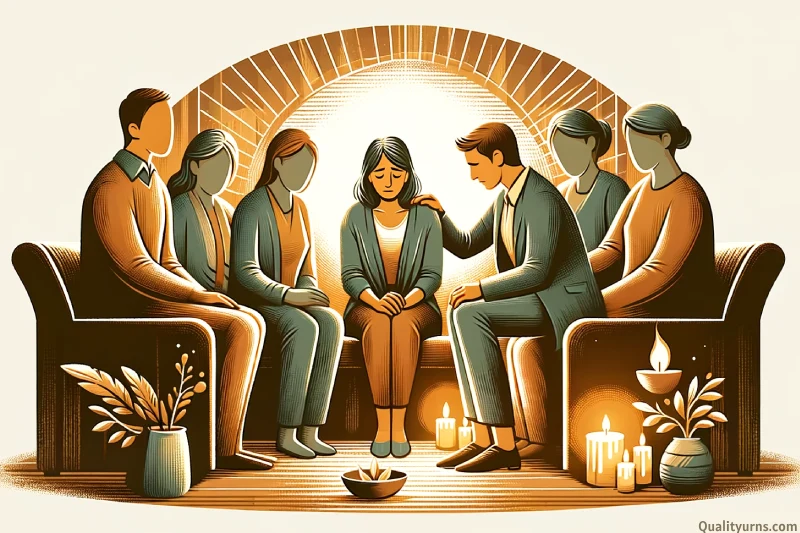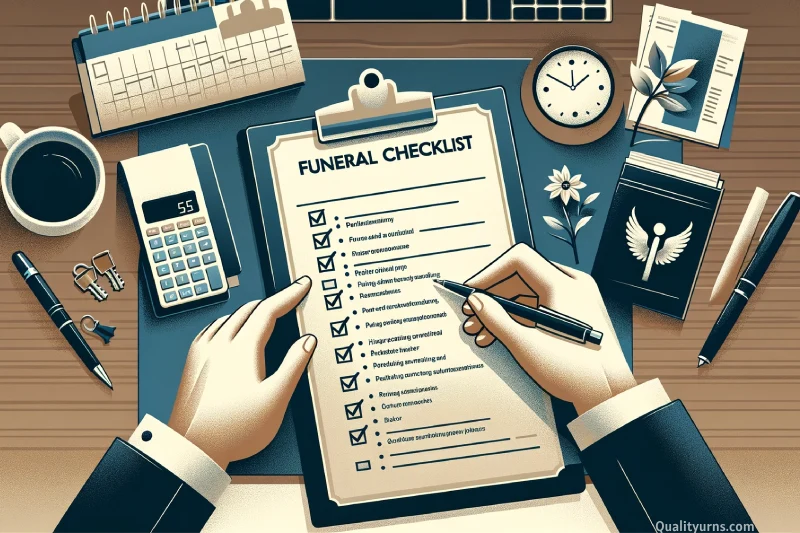
This post may have affiliate links. We may earn a commission at no extra cost to you. Thank you for your support!
Starting your pre planning funeral checklist is a crucial step in easing the burden on your family during a challenging time.
When a loved one passes away, families often find themselves overwhelmed with the number of tasks that need immediate attention.
This guide aims to simplify the process and ensure that all critical aspects are considered well in advance.
Pre Planning Funeral Checklist Steps

Step 1: Gather Personal Information
A crucial part of your pre planning funeral checklist involves compiling all your personal information.
These documents are essential for legal and logistical reasons and help your family handle affairs smoothly after your passing.
It’s important to store them in a safe, accessible place.
An accordion file organizer folder is a great option to organize these documents neatly and ensure they’re easily found when needed.
Key Documents to Include:
- Legal identification (driver’s license, passport)
- Birth certificate
- Social Security card
- Marriage certificate (if applicable)
- Will and any trust documents
- Life insurance policies
- Property deeds and vehicle titles
- List of bank accounts and safe deposit boxes
- Retirement accounts and pension details
- Usernames and passwords for important online accounts
Step 2: Decide on the Type of Service
Your pre planning funeral checklist should reflect the type of service you prefer. This could range from traditional funerals to more unique celebrations of life.
It’s important to consider your personal, cultural, and religious beliefs when making this decision.
Service Preferences to Consider:
- Type of service (traditional, non-religious, celebration of life)
- Location for the service (funeral home, religious place, outdoors)
- Specific religious or cultural rituals to include
- Preference for a private family service or a public event

Step 3: Choose a Funeral Home
Selecting a funeral home is a significant step in your pre planning funeral checklist. Look for a funeral home that aligns with your budget and emotional needs, and feels respectful and comforting to your family.
Factors to Consider When Choosing a Funeral Home:
- Location and accessibility for family and friends
- Services offered and their costs
- Reputation and reviews from other families
- Comfort level with the staff and facilities

Step 4: Choosing a Burial or Cremation Option
Your pre planning funeral checklist should include your preference for burial or cremation. Deciding between cremation vs burial is a significant choice.
This decision is deeply personal and may be influenced by various factors, including religious beliefs, environmental concerns, and personal values.
Additionally, if you choose cremation, selecting an urn that reflects your personality or holds special meaning can be a comforting aspect for your loved ones.
For a burial, considering the type of casket and the location of the burial plot are important factors that can be pre-arranged to reflect your wishes.
Key Considerations:
- Type of burial (traditional, green burial)
- Choice of cremation and handling of ashes
- Purchase of a burial plot or urn
- Specifics about the headstone or memorial plaque
Step 5: Deciding Funeral Service Participants
Crafting a meaningful ceremony is an essential part of your pre planning funeral checklist.
This involves deciding who will play key roles in your service, such as officiants, eulogists, or pallbearers.
Roles to Assign and Details to Specify:
- Selection of officiant or leader of the service
- Pallbearers and honorary pallbearers
- People to give eulogies or readings
- Musicians or singers if desired
- Ushers to assist guests during the service

Step 6: Selecting Funeral Music and Readings
Personalizing your service with music and premade poems and readings can make it more meaningful.
Include your favorite songs and hymns in your pre-planning funeral checklist.
Suggestions to Consider:
- List of favorite songs or hymns
- Specific readings or poems
- Instructions on who should perform these readings or play music

Step 7: Crafting an Obituary
Writing an obituary is a key element of your pre planning funeral checklist. It’s an opportunity to reflect on your life’s story and leave a lasting legacy.
You can write it yourself or outline the key points for someone else to write.
Important Aspects to Include in Your Obituary:
- Brief biography highlighting major life events
- Family members, both surviving and predeceased
- Significant achievements and contributions
- Personal anecdotes or quotes that reflect your character
- Information about the funeral service and any preferred charities for donations
Step 8: Communication with Family
Ensuring your family is aware of your plans is a vital part of your pre planning funeral checklist.
Discuss your wishes with them to ensure they understand and can respect your decisions.
Key Topics to Discuss with Family:
- Your overall wishes for the funeral and burial
- Specific requests for the service and participants
- Any pre-arranged plans with a funeral home or other services
- Location of important documents and information

Step 9: Arranging Transportation and Accommodation
Consider transportation and accommodation arrangements for guests who may be traveling from afar.
This step in your pre planning funeral checklist ensures that attending your service is as stress-free as possible for your loved ones.
Transportation and Accommodation Details:
- Preferred transportation services for guests
- Hotel or lodging options near the service location
- Any group discounts or arrangements that can be made in advance
Step 10: Planning for Post-Service Gathering
Many families choose to have a gathering after the funeral service. This can be a time for sharing memories and offering support to one another.
Gathering Planning Ideas:
- Venue selection for the gathering
- Catering or food arrangements
- Activities or speeches during the gathering

Step 11: Seeking Grief Support
Acknowledging the emotional aspect is an important inclusion in your pre planning funeral checklist.
Consider resources for grief support for yourself and your loved ones. It’s helpful to be aware of the five stages of grief, as they can guide you through the process of healing.
Grief Support Options to Consider:
- Local grief counseling and support groups
- Online forums and support networks
- Books and resources on coping with loss
- Contact information for close friends or clergy who can provide support
Step 12: Sharing Your Experience
Encourage your loved ones to share their memories and experiences as part of your pre planning funeral checklist.
This not only helps in the grieving process but also ensures that your life is celebrated in a way that is meaningful to those you leave behind.
Ways to Encourage Sharing:
- Request for written memories or anecdotes to be shared at the service
- Suggestion of a memory board or guest book at the service
- Consideration of a video or audio recording of stories and memories

Step 13: Setting Up a Memorial Fund or Charity Contributions
If you wish to have donations made to a charity in your memory, include this in your pre planning funeral checklist.
This can be a way to leave a lasting impact and contribute to a cause you care about.
Charitable Considerations:
- Selection of a charity or cause
- Instructions on how to make donations
- Whether to mention this preference in your obituary
Step 14: Documenting Final Wishes for Personal Items and Heirlooms
An often overlooked but important part of your pre planning funeral checklist is documenting your wishes for personal items and heirlooms.
This step involves deciding who should receive specific belongings, thereby reducing potential conflicts among family members.
Key Elements to Consider:
- List of significant personal items, heirlooms, and keepsakes
- Designated recipients for each item
- Any special instructions or stories associated with these items
- Legal documentation if necessary to ensure wishes are followed

Step 15: Reviewing and Updating Your Checklist
Your pre planning funeral checklist is a living document that should be reviewed and updated regularly. Life changes, and your wishes might change too.
When to Review Your Checklist:
- After significant life events (marriage, birth of a child, retirement)
- Every few years to ensure it reflects your current wishes
- Whenever you change significant documents or policies
Final Words
Your pre planning funeral checklist is a thoughtful, responsible way to ensure that your final wishes are understood and respected.
It’s a gift to your loved ones, providing them with guidance and peace of mind during a difficult time.
By following this detailed checklist, you can be confident that every aspect of your end-of-life planning is covered, leaving a lasting legacy of love and care.
FAQ
What is a pre-planning funeral checklist?
A pre-planning funeral checklist is a guide that helps you organize and record all the details for your funeral and related arrangements in advance.
Why should I use a pre-planning funeral checklist?
Using a checklist ensures all important aspects of your funeral are covered, reducing stress for your family and ensuring your wishes are followed.
What documents should I gather for my pre-planning funeral checklist?
Include your legal ID, birth certificate, Social Security card, marriage certificate, will, trust documents, life insurance policies, property deeds, vehicle titles, bank and retirement account details, and online account information.
How do I ensure my family knows my funeral wishes?
Discuss your plans with your family, and let them know where you’ve stored your important documents and checklist.
Can I specify donations to a charity in my checklist?
Yes, select a charity or cause and provide instructions for making donations in your memory.
What details should I include in my obituary?
Include a brief biography, family member details, significant achievements, personal anecdotes, and funeral service information.
How can I support my loved one’s grief?
Research grief counseling, support groups, online forums, and provide contact information for close friends or clergy who can help.
